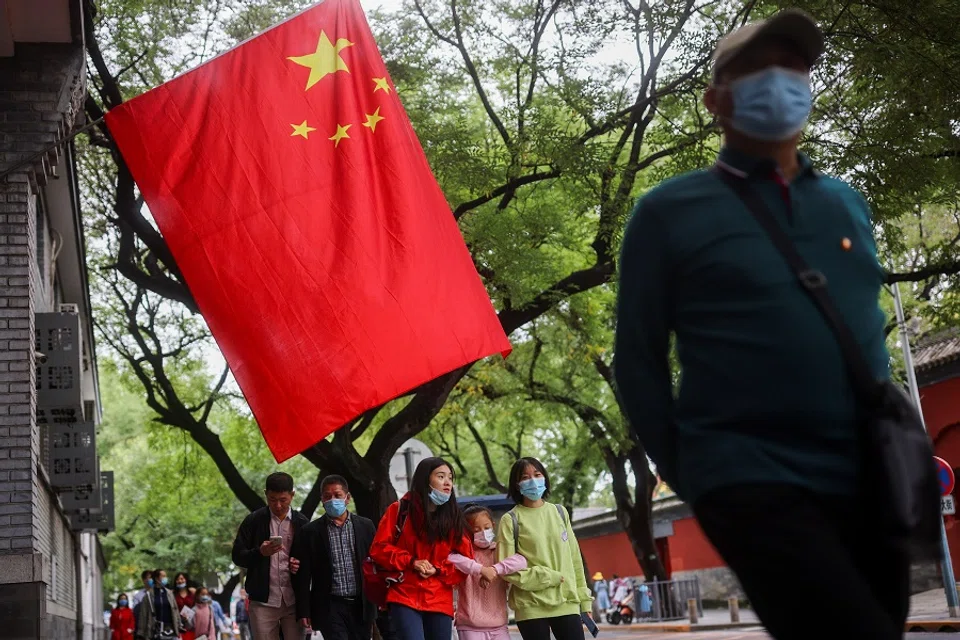China will be the US's most difficult opponent
While there may have been some minor tweaks from the US side to smoothen relations with China, the overall suppression and containment of China remains unchanged from the Trump to Biden eras as fundamental differences exist between the two countries, says Wu Guo.

The US has made several notable moves against China recently. The first is the establishment of the military alliance AUKUS - a trilateral security partnership between the UK, the US and Australia that will give Australia access to nuclear-powered submarines and risks angering France.
This is yet another mechanism that makes it easier for English-speaking countries to come together to contain China. In fact, Anglophone white Christian countries not only regard the Asian continent as an alien and non-English speaking Western countries as potential aliens, but often cooperate with each other at critical times. It is thus clear that the nuclear weaponisation of a country in Oceania that originally possessed none such capabilities is an attempt at casting a huge net to encircle and contain China - specifically one that spans the Atlantic Ocean to the Indo-Pacific region and extends to the South Pacific.
The second action is the establishment of a China Mission Center (CMC) as announced by Central Intelligence Agency (CIA) director William Burns on 7 October. He said the CMC aims to "further strengthen our collective work on the most important geopolitical threat we face in the 21st century, an increasingly adversarial Chinese government". American media reported that similar centres set up by the CIA in the past were targeted at terrorist forces in the former Union of Soviet Socialist Republics (USSR) and the Middle East, which shows that the Americans consider China the next biggest threat following the former two.
The third action is the open declaration that US troops have been deployed in Taiwan for at least a year and have been training local forces while there. On 7 October, The Wall Street Journal ran an exclusive report stating that roughly two dozen members of US special operations and support troops have been training small units of Taiwan's ground forces for at least a year. It is clear that the US has completely ignored its previous agreement to keep troops out of Taiwan and instead has a presence on the island as Taiwan's paramilitary ally. That is, the US is openly challenging China's sovereignty.
...the US is hoping to ease relations and enhance dialogue on the diplomatic level while at the same time tightening the containment of China on a broader and more extensive level.

Against the backdrop of these actions, any recent adjustments in China-US relations, including the release of Huawei CFO Meng Wanzhou and high-level US-China talks in Switzerland, must only be seen as strategic tweaks on the US side. That is, the US is hoping to ease relations and enhance dialogue on the diplomatic level while at the same time tightening the containment of China on a broader and more extensive level.
The US softened its stance because it indeed needs China's cooperation in some areas. Considering its own security interests, the Joe Biden administration does not wish to completely destroy its relationship with China for the time being as well. Thus, compared with the former Donald Trump administration's extreme measures to suppress and contain China, these recent adjustments should be welcomed.
Strategic competition through and through
Despite the micro adjustments mentioned above, the big picture of US-China relations is basically set in stone. The US sees China as a "strategic competitor" and "threat", and has mapped out new strategies internally and internationally in terms of military planning, intelligence-sharing and nuclear power deployment.
Undoubtedly, it took the US tremendous effort to deal with its previous two competitors. Firstly, while the US destroyed the USSR, the Communist Party of the Soviet Union (CPSU) and the Warsaw Pact, the USSR was not a nation with its own cultural ballast but merely a modern political construct. Besides, its constitution also gave its republics, essentially nation-states in themselves, the right to withdraw.
The collapse of the artificially constructed USSR is not tantamount to the collapse of Russia. Even without the framework of the USSR, its ideology or its global expansion strategy, Russia is still the US's competitor and a nuclear power that helps keep the US in check.
In fact, the US's longstanding arrogance, condescension and sole concern for its own interests are in itself contradictory to the tough transformative work they hope to do.

Whatever the common historical origins of the Eastern Orthodox faith that the Russians returned to and the mainstream Protestant faith in the US, there seems to be no end to the mutual mistrust between Americans and Russians. This state of affairs is dictated by Russia's size and the fact that it possesses both Eastern and Western cultural characteristics. Not only that, the dissolution of the USSR significantly reduced the military pressure on China, and pushed its former Central Asia republics into the China-led Shanghai Cooperation Organisation.
Next, in terms of dealing with terrorist forces in the Middle East, while the US has executed or shot dead various individual local leaders and achieved a certain revenge for 9/11, its efforts at eliminating extremism through democratisation have met a dismal end.
This is because, while it is still within the technical capabilities of the US to overthrow the regime of a small country and shoot several leaders who have gone into hiding in the short term, fundamentally transforming the deep-rooted political culture and social structure of a people is beyond the means of American money and military power. In fact, the US's longstanding arrogance, condescension and sole concern for its own interests are in itself contradictory to the tough transformative work they hope to do.
Underlying differences
Nor is it because of its domestic crisis of recent years that the US has set China as a target or scapegoat for venting its frustration. The US hopes that China can gradually become more liberal, democratic and accepting of its pop culture symbols. But such demands only work on the level of mass commercial culture, such as in the case of Universal Studios. China rejects these demands on the political level, which leads to the Americans' sense of despair and hopelessness because they feel that their messages have not been hoisted in.
...the US has never stated - whether implicitly or explicitly - that this is a zero-sum game. They are merely listing the many "concerns" that they have.

Additionally, between 2004 and 2005, when I was still a student in the US, I could already sense that middle-class Americans and even university professors had negative attitudes towards China but were obsessed with Japanese culture and literature. Hence, China-US competition is not only the outward projection of America's blue-collar plight or political polarisation, but also stems from mutual mistrust and huge differences between both sides. Among today's American youths, the first thing that comes to mind regarding understanding and learning Chinese is business, as if there can be no other motivations apart from money-making ones.
In fact, even if the Chinese think that Americans have a zero-sum mentality while they themselves advocate mutual respect amid differences, it is difficult for the Chinese to convince the Americans of this as the US has never stated - whether implicitly or explicitly - that this is a zero-sum game. They are merely listing the many "concerns" that they have.
The response to these "concerns" is also not a question of zero-sum games or the ability to tolerate differences. For example, the call for national reunification and the demands and actions taken by China as a matter of course for disputed territories are regarded by the US as disrupting order, regional stability and the US's security interests. Fundamentally, this shows that the way both countries see the world and define their respective rights and interests are in opposition to each other. It is difficult for China to persuade the US to "tolerate" what the latter considers to be a disruption of order and stability and violation of interests based on China's general rhetoric of tolerance and coexistence.
My view is that the US's China policy has stayed the same from Trump's era to Biden's era. Tensions will occasionally be eased on the tactical and micro level, but all-round competition and suppression will intensify on the strategic and macro level. Observers need not be overly optimistic about easing tensions because tensions between both parties have already extended into the areas of race, civilisation, ideology, values and national interests. But because of China's sheer size, cultural resilience and fighting spirit, the US will come to realise that China will become its most difficult opponent to deal with yet.
Related: AUKUS: Aggravating tensions and dividing the world | The US has AUKUS. Where are China's alliances? | Japanese academic: US moving away from ASEAN centrality to defend its regional interests | The flaws in Biden's China policy | The war on terrorism has ended. Can the US win the next battle of great power competition?


![[Big read] When the Arctic opens, what happens to Singapore?](https://cassette.sphdigital.com.sg/image/thinkchina/da65edebca34645c711c55e83e9877109b3c53847ebb1305573974651df1d13a)


